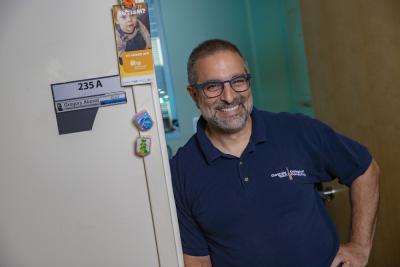Aug 20, 2018
If you go outside School of Interactive Computing Professor Gregory Abowd’s office, you might find a rather odd collection of keepsakes.
A wooden toilet seat sits on a table in the front right corner of his lab space, a metal toilet paper holder not far away. A bobblehead sits behind that, unmistakably the bearded figure of the longtime College of Computing faculty resting his left foot on the top of a miniature toilet. The smallest of these trinkets is simply just a carving of a toilet, and behind it all, yes, the blue plastic door of a portable toilet you might see at a concert or other outdoor venue.
Each item was given to Abowd by his students, curious selections without the proper context. They might indicate underlying animosity if not for the bright smile they bring to Abowd’s face as he describes the origin of each.
One man’s chamber pot, he might say, is another man’s reminder of where’s he’s been and where his students have gone. Earlier this year, he graduated his 30th Ph.D. student and, among his impressive list of accomplishments, that’s the one he cites as the most important.
A unique tradition
The story goes like this:
When Abowd was a graduate student at the University of Oxford, his supervisor described his thesis research as “a beautiful porcelain pot” that he had forgotten to – we’ll just say, “fill.”
“These rather disparaging words have since had a profoundly positive influence on me,” stated a posted explanation of the bathroom fixtures around his lab space. “Shortly after successfully defending my thesis, a good friend, who knew how deflating my supervisor’s words were, gave me a little figurine of a toilet and asked me to keep it nearby in order to preserve my humility throughout my career.”
Since then, it has become tradition to continue to keep Abowd humble throughout each accomplishment of his career – being awarded tenure, a promotion to full professor, distinguished professor, regents’ professor, and J.Z. Liang Chair.
He remembers each of his 30 Ph.D. grads like family. Comparing them to his own 11 brothers and sisters, whom he can understandably recite in order, he shows an uncanny ability to do the same with his students. Prompted with an easy one – his first Ph.D. graduate – Abowd didn’t hesitate.
“Oh, Kurt Stirewalt,” Abowd immediately said, as if stunned to receive such a softball question. “He went to Michigan State, but he’s no longer there.”
Indeed, Stirewalt graduated in 1997, earned an NSF CAREER Award in 2000, and reached the level of associate professor with tenure at Michigan State. Since then, he has gone on to become vice president of application architecture at LogicBox.
Ok, a tougher one then: Ph.D. graduate No. 17. A slight hesitation.
“That would be Tracy Westeyn, right?”
Right. He advised her with Professor Thad Starner through her graduation in 2010. She has since gone on to a career in Washington, D.C.
One more: No. 9. A long pause.
“Would that be Lonnie?” Abowd asked. He’s one off. Lonnie Harvel was No. 8 and graduated in 2005. “So, the one right after. That would be Giovanni (Iachello).”
Right again. Iachello graduated in 2006 and is now the head of international and new markets at LinkedIn.
Where they’ve gone
The rest of Abowd's academic family is an equally impressive reminder of the quality of the students that have come through his lab. One former student is at Google, another at Samsung Electronics. There’s one at Amazon Lab126 and one at Intel Labs. One has an ever-expanding list of patents, and a host of others have gone on to become academic faculty around the world – Sweden, India, Korea, Texas, New York, Washington, and more.
Abowd hesitated when asked whether 30 Ph.D. graduates was a big number, then put it into context.
“It’s a big number when you think that most of them have gone on to academic positions,” Abowd said. “I wouldn’t want to say that’s the best option for everyone, but it is something I’m proud of.”
The impact is exponential. Many of his graduate students have gone on to have graduate students of their own. While his 30 students’ destinations are relatively easy to map, the task gets significantly more challenging with second and third generations that number in the hundreds.
They get together as often as possible, usually at conferences like the ACM CHI Conference on Human Factors in Computing Systems or Ubicomp. At CHI 2018, Abowd estimated about 50 or 60 former students, including masters and undergraduates, attended their get-together. Abowd has connected with these students in a profound way – from one-on-one mentorship to “making music” together in a band (okay, they were just pretending).
“It’s the proudest academic accomplishment for me,” Abowd said of his students. “The students and the quality of the students. We are teachers first, and you develop very close long-term relationships with them. Almost all of them, I am still in contact with, so it really is like your own children.”




